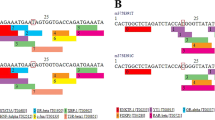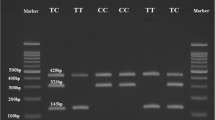Abstract
Purpose
The purpose of this study was to evaluate the association between rs13266634 polymorphism in SLC30A8 gene and type 2 diabetes in Iranian population, and also to provide a way for adjusting the deviation from the Hardy-Weinberg equilibrium.
Methods
This was a case-control study, the patients were selected from the East Azerbaijan province, Iran. In this study, 125 patients with type 2 diabetes (cases) and 125 healthy individuals (controls) were studied. Genotype and allele frequencies were determined in both groups, and the deviations from the Hardy-Weinberg equilibrium were assessed using Bayesian analysis.
Results
A statistically significant association was observed between rs13266634 polymorphism in SLC30A8 gene and type 2 diabetes. In genotype assessing, data analysis showed that, TT genotype play a role in diabetes type 2 risk (P = 0.001). Subjects with TT genotype had a lower risk of diabetes compared to those with CC and CT genotypes. Also, there was no significant relationship between this polymorphism and type 2 diabetes mellitus in the absence of Hardy-Weinberg equilibrium.
Conclusion
Our findings show that, rs13266634 polymorphism was associated with the type 2 diabetes risk in the population of Eastern Azerbaijan province; however, the low number of TT homozygous genotypes affected the precision of the results. Also, the deviation from HWE affected the results. It is recommended to perform further studies to establish Hardy-Weinberg equilibrium. The inconsistency in the results may be due to the ignorance of this equilibrium.

Similar content being viewed by others
References
Ding W, Xu L, Zhang L, Han Z, Jiang Q, Wang Z, et al. Meta-analysis of association between TCF7L2 polymorphism rs7903146 and type 2 diabetes mellitus. BMC Med Genet. 2018;19(1):38.
Zhang Y, Pan X-F, Chen J, Xia L, Cao A, Zhang Y, et al. Combined lifestyle factors and risk of incident type 2 diabetes and prognosis among individuals with type 2 diabetes: a systematic review and meta-analysis of prospective cohort studies. Diabetologia. 2020;63(1):21–33.
James SL, Abate D, Abate KH, Abay SM, Abbafati C, Abbasi N, et al. Global, regional, and national incidence, prevalence, and years lived with disability for 354 diseases and injuries for 195 countries and territories, 1990–2017: a systematic analysis for the Global Burden of Disease Study 2017. Lancet. 2018;392(10159):1789–858.
Chatterjee S, Khunti K, Davies MJ. Type 2 diabetes. Lancet. 2017;389(10085):2239–51.
Szabo M, Máté B, Csép K, Benedek T. Genetic approaches to the study of gene variants and their impact on the pathophysiology of type 2 diabetes. Biochem Genet. 2018;56(1–2):22–55.
Voight BF, Scott LJ, Steinthorsdottir V, Morris AP, Dina C, Welch RP, et al. Twelve type 2 diabetes susceptibility loci identified through large-scale association analysis. Nat Genet. 2010;42(7):579–89.
Gruber K. Moving towards a more precise treatment of diabetes. Lancet Diabetes Endocrinol. 2015;3(3):171.
Li M, Li C. Assessing departure from hardy-Weinberg equilibrium in the presence of disease association. GENET EPIDEMIOL. 2008;32(7):589–99.
Namipashaki A, Razaghi-Moghadam Z, Ansari-Pour N. The essentiality of reporting Hardy-Weinberg equilibrium calculations in population-based genetic association studies. Cell J. 2015;17(2):187.
Preuß Michael H, Ziegler A. Comments on: association study between coronary artery disease and rs1333049 and rs10757274 polymorphisms at 9p21 locus in south-West Iran. Cell J. 2016;17(4):756.
Mohaddes S, Karami F, Gharesouran J, Bahrami A. The soluble carrier 30 A8 (SLC30A8) gene polymorphism and risk of diabetes mellitus type 2 in eastern Azerbijan population of Iran. J.Sci.I.R.I. 2012;23(1):15–20.
Wakefield J. Bayesian methods for examining Hardy–Weinberg equilibrium. Biometrics. 2010;66(1):257–65.
Sandhu MS, Weedon MN, Fawcett KA, Wasson J, Debenham SL, Daly A, et al. Common variants in WFS1 confer risk of type 2 diabetes. Nat Genet. 2007;39(8):951–3.
Saxena R, Voight BF, Lyssenko V, Burtt NP, de Bakker PI, Chen H, et al. Genome-wide association analysis identifies loci for type 2 diabetes and triglyceride levels. Science. 2007;316(5829):1331–6.
Sladek R, Rocheleau G, Rung J, Dina C, Shen L, Serre D, et al. A genome-wide association study identifies novel risk loci for type 2 diabetes. Nature. 2007;445(7130):881–5.
Hu C, Zhang R, Wang C, Wang J, Ma X, Lu J, et al. PPARG, KCNJ11, CDKAL1, CDKN2A-CDKN2B, IDE-KIF11-HHEX, IGF2BP2 and SLC30A8 are associated with type 2 diabetes in a chinese population. PLoS One. 2009;4(10).
Kommoju UJ, Samy SK, Maruda J, Irgam K, Kotla JP, Velaga L, et al. Association of CDKAL1, CDKN2A/B & HHEX gene polymorphisms with type 2 diabetes mellitus in the population of Hyderabad, India. Indian J Med Res. 2016;143(4):455–63.
Suzuki K, Akiyama M, Ishigaki K, Kanai M, Hosoe J, Shojima N, et al. Identification of 28 new susceptibility loci for type 2 diabetes in the Japanese population. Nat Genet. 2019;51(3):379–86.
Lee Y-H, Kang ES, Kim SH, Han SJ, Kim CH, Kim HJ, et al. Association between polymorphisms in SLC30A8, HHEX, CDKN2A/B, IGF2BP2, FTO, WFS1, CDKAL1, KCNQ1 and type 2 diabetes in the Korean population. J Hum Genet. 2008;53(11–12):991–8.
Xu K, Zha M, Wu X, Yu Z, Yu R, Xu X, et al. Association between rs13266634 C/T polymorphisms of solute carrier family 30 member 8 (SLC30A8) and type 2 diabetes, impaired glucose tolerance, type 1 diabetes—a meta-analysis. Diabetes Res Clin Pract. 2011;91(2):195–202.
Al-Rubeaan K, Siddiqui K, Saeb AT, Nazir N, Al-Naqeb D, Al-Qasim S. ACE I/D and MTHFR C677T polymorphisms are significantly associated with type 2 diabetes in Arab ethnicity: a meta-analysis. Gene. 2013;520(2):166–77.
Fan M, Li W, Wang L, Gu S, Dong S, Chen M, et al. Association of SLC30A8 gene polymorphism with type 2 diabetes, evidence from 46 studies: a meta-analysis: Springer; 2016.
Ng MC, Park KS, Oh B, Tam CH, Cho YM, Shin HD, et al. Implication of genetic variants near TCF7L2, SLC30A8, HHEX, CDKAL1, CDKN2A/B, IGF2BP2, and FTO in type 2 diabetes and obesity in 6,719 Asians. Diabetes. 2008;57(8):2226–33.
Cho Y, Kim T, Lim S, Choi S, Shin H, Lee H, et al. Type 2 diabetes-associated genetic variants discovered in the recent genome-wide association studies are related to gestational diabetes mellitus in the Korean population. Diabetologia. 2009;52(2):253–61.
Shokrzadeh M, Mohammad PA, Gerami M, Daryaei M, Abbasi RM, Rajabi SSM. Evaluation of SLC30A8 gene polymorphism (RS13266634) distribution in patients with diabetes type 2 in west Mazandaran-Iran. 2018.
Salem SD, Saif-Ali R, Ismail IS, Al-Hamodi Z, Muniandy S. Contribution of SLC30A8 variants to the risk of type 2 diabetes in a multi-ethnic population: a case control study. BMC Endocr Disord. 2014;14(1):2.
Little J, Higgins JP, Ioannidis JP, Moher D, Gagnon F, Von Elm E, et al. STrengthening the REporting of genetic association studies (STREGA): an extension of the STROBE statement. Hum Genet. 2009;125(2):131–51.
Acknowledgements
This work was supported by a fund from Hamadan University of Medical Sciences (Contract No. 9609286037). This work is a part of the results of the PhD thesis of Mr. Ghaffari, the corresponding author of this paper, supervised by Professor Soltanian, the paper’s first author.
Author information
Authors and Affiliations
Contributions
Ali Reza Soltanian, Bistoon Hosseini, and Mohammad Ebrahim Ghaffari analyzed the data and drafted the manuscript. Ali Reza Soltanian, Fatemeh Bahreini, and Mohammad Ebrahim Ghaffari designed the study and directed the implementation. Hossein Mahjub and Fatemeh Bahreini edited the manuscript for intellectual content and provided critical comment on the manuscript.
Corresponding author
Ethics declarations
Conflict of interest
The authors declare no conflict of interest.
Ethical approval
This study was approved by the Ethical committee, Hamadan University of Medical Sciences. The written informed consents were obtained from all the participants before conducting the study.
Additional information
Publisher’s note
Springer Nature remains neutral with regard to jurisdictional claims in published maps and institutional affiliations.
Rights and permissions
About this article
Cite this article
Soltanian, A.R., Hosseini, B., Mahjub, H. et al. A Bayesian analysis for investigating the association between rs13266634 polymorphism in SLC30A8 gene and type 2 diabetes. J Diabetes Metab Disord 19, 337–342 (2020). https://doi.org/10.1007/s40200-020-00514-3
Received:
Accepted:
Published:
Issue Date:
DOI: https://doi.org/10.1007/s40200-020-00514-3




